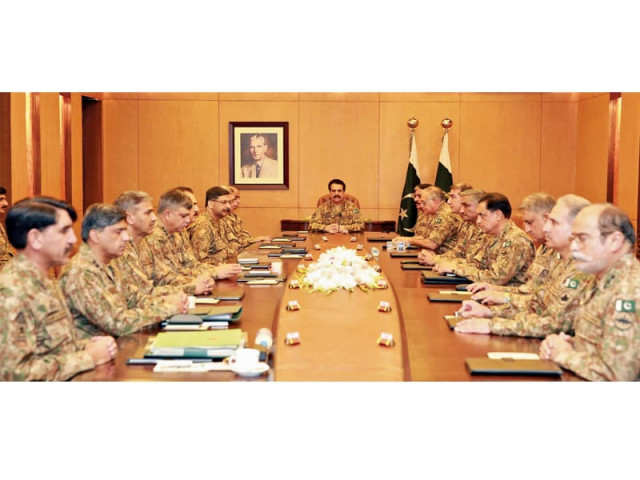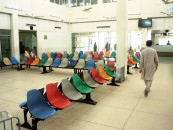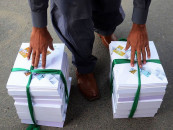Capital in crisis: Army urges non-violent, political solution
Corps commanders say further use of force will only aggravate the problem.

A day after the protests by the Pakistan Tehreek-e-Insaf (PTI) and Pakistan Awami Tehreek (PAT) took a violent turn, top military commanders urged all sides to resolve the prevailing political crisis through talks “without wasting any time and without recourse to violent means.”
Presided over by army chief General Raheel Sharif, a meeting of the corps commanders while reaffirming support to democracy, reviewed with “serious concern, the existing political crisis and the violent turn it has taken, resulting in large scale injuries and loss of lives.”
“Further use of force will only aggravate the problem,” said a statement issued by the military’s media wing, the Inter-Services Public Relations (ISPR), after the meeting of the top military commanders amid pitched battles between protesters led by PTI chief Imran Khan and PAT leader Dr Tahirul Qadri.
“It was once again reiterated that the situation should be resolved politically without wasting any time and without recourse to violent means,” the ISPR statement added.
It also said that the army remains committed to playing its part in ensuring security of the state and would never fall short of meeting national aspirations.
The meeting was originally scheduled to take place on Monday but it was brought forward as a result of continuing clashes between the police and PTI and PAT workers.
All eyes were on the General Headquarters (GHQ) as the army’s role assumed greater significance after the lingering standoff between the protesting parties and the government.
From the ISPR statement, it appears that the army is reluctant to directly intervene in the crisis. The move is apparently attributed to the earlier controversy surrounding whether or not the government had asked the army chief to broker a deal with the protesting parties.
Following the army chief’s meeting with Imran and Qadri, the government distanced itself from the interactions, suggesting that it had never requested or asked General Raheel to mediate or act as a guarantor.
Prime Minister Nawaz Sharif said on the floor of the National Assembly that Imran and Qadri had requested for meetings with the army chief – a claim strongly rejected by both leaders. Interior Minister Chaudhry Nisar Ali Khan later told a news conference that the government asked the army chief for a ‘facilitative role’ and not to act as ‘mediator’ or ‘guarantor’ in the crisis.
This came following scathing criticism from parliamentary leaders of the opposition and allied parties of the government’s decision to seek help from the army chief which, according to them, was unconstitutional.
The interior minister’s claim led the military’s media wing to issue a clarification stating the army chief was asked by the government to play a ‘facilitative role’ to end the political impasse.
Military sources said the corps commanders voiced concerns over the government’s handling of the issue and decided that the army chief must now tread a careful path in order to prevent such a situation in the future.
Published in The Express Tribune, September 1st, 2014.



















COMMENTS
Comments are moderated and generally will be posted if they are on-topic and not abusive.
For more information, please see our Comments FAQ